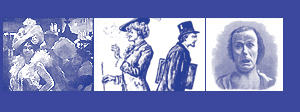Criminality
Author :
Title : Henry Maudsley, Body and Mind, 1873, in V. Skultans (ed.), Madness and Morals: Ideas on Insanity in the Nineteenth Century (1975).
Keywords: Maudsley. Born Criminal. Degeneration. Criminal class. Attention. Physiognomy. Craniometry. Measurement.
Introduction
Henry Maudsley was one of the most trenchant of late-nineteenth century British positivists. He attempted to free the study of the human mind from what he considered to be the vapours and superstitions of moralists, theologians, philosophers, and metaphysicians in general. It was his belief that the mind was simply a function of the brain. There was no ghost lurking in the machine, no soul or consciousness existing apart from, though somehow inseparably linked to the material of the human body. His materialism led him to emphasise that the royal road to the mind lay through the physiology of the brain and nervous system, though he carried out few experiments himself. Furthermore, he was convinced that the material of the body was inherited, a product of evolutionary development; unless, that is, it was a product of evolutionary regression, of degeneration.
Maudsley’s most important contribution to the nineteenth-century debate about the causes of criminal behaviour is perhaps Responsibility in Mental Disease, published in 1874. It contains his well-known discussion of the ‘tyranny of organization’, and re-emphasises and enlarges upon points made earlier in Body and Mind (1873), in V. Skultans (ed.), Madness and Morals: Ideas on Insanity in the Nineteenth Century (London, 1975), pp. 249-51. Maudsley held that criminality was an inherited disease or condition, a product of degenerate characteristics handed down from generation to generation, tending eventually to the extinction of the morbid type. He warned of a class of incorrigible, degenerate criminals, a morbid variety of humankind infesting English cities. Each one of these degenerates was a ‘precocious prodigy of evil proclivities’. He argued that there is a very fine line between criminality and insanity, a shadowy ‘borderland between insanity and crime’. Sometimes crime is a product of a neurosis linked to mental disease or epilepsy. Sometimes crime leads to insanity, immoral actions causing physiological changes, which can be passed on to the next generation. Maudsley counselled tolerance, however, arguing that the truly insane must be treated in mental hospitals rather than confined in prisons, and pointing out that the degenerate criminal has little or no control over his or her behaviour, which is simply a product of defective ‘organization’. But he also wanted to quarantine these natural-born criminals and the congenitally insane in order to prevent them from infecting normal society; and he believed that severe and condign punishment is justified because it can sometimes act as a deterrent. He would welcome a policy of selective breeding (eugenics) in an ideal world, but he thought the practical problems were insurmountable.
Importantly, Maudsley did not believe that all criminals were degenerates. At an individual level, criminal behaviour can be caused by psychological motivations such as frustration, teasing, imitation, coercion, the provocation of circumstances, and so on. A strong will, the ability to control one’s emotions, is thus important. At a social level, he linked increasing crime to socialism and cosmopolitanism and the overall progress of civilisation. General environmental circumstances play an important role in some criminal behaviour, and so each nation has a responsibility to educate its citizens, to encourage class affection, and to promote moral and physical hygiene. But it is a debatable how much faith Maudsley actually had in these measures. At least one of his contemporaries thought his later writings little more than a ‘hymn for pessimism’.
Back to Documents | Introduction | page1 | page 2 | page 3

